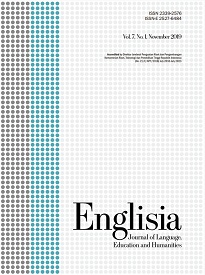Indonesian higher education students’ perception on critical literacy
DOI:
https://doi.org/10.22373/ej.v11i2.20003Keywords:
Critical literacy, Higher education student, Students’ perceptionAbstract
Critical literacy is a crucial aspect of education that empowers individuals to analyse, interpret, and evaluate texts critically. Despite its significance, the integration of critical literacy in the Indonesian higher education system remains limited. This study aims to bridge this gap by examining the perceptions of Indonesian higher education students about critical literacy. The research question guiding this study is: What are the perceptions of Indonesian higher education students regarding critical literacy and its importance in the context of their academic and professional development? The study employs a qualitative research design using the single-case study method. Data collection is conducted through interviews, and the data is analysed using case study analysis techniques. The study takes place in an English language education program at a private university in Yogyakarta, Indonesia, which prioritises critical literacy in its curriculum. The findings of this study contributed to the understanding of how Indonesian higher education students perceive and engage with critical literacy and inform strategies to promote critical literacy skills among students. Ultimately, it aims to cultivate a generation of critically literate individuals who can actively engage in social, cultural, and professional contexts, contributing to the development of a knowledgeable and empowered society.
Downloads
References
Amgott, N. (2018). Critical literacy in #DigitalActivism: Collaborative choice and action. The International Journal of Information and Learning Technology, 35(5), 329–341. https://doi.org/10.1108/IJILT-05-2018-0060
Creswell, J. W. (2012). Educational research: Planning, conducting, and evaluating quantitative and qualitative research (4th ed). Pearson.
Fajardo, M. F. (2015). A review of critical literacy beliefs and practices of English language learners and teachers. University of Sydney Papers in TESOL, 10, 29–56.
Gustine, G. G. (2018). A SURVEY ON CRITICAL LITERACY AS A PEDAGOGICAL APPROACH TO TEACHING ENGLISH IN INDONESIA. Indonesian Journal of Applied Linguistics, 7(3), 531. https://doi.org/10.17509/ijal.v7i3.9798
Hearfield, C., & Boughton, B. (2018). Critical Literacy and Transformative Social Practice: An Ethical Grounding. Educational Theory, 68(4–5), 477–494. https://doi.org/10.1111/edth.12324
Hidayat, D. N. (2019). Conversation Analysis and Its Implications to Language Teaching. TARBIYA: Journal of Education in Muslim Society, 6(2), 197–209. https://doi.org/10.15408/tjems.v6i2.15138
Kaur, S. (2013). Critical Literacy Practices of English Major in a Tertiary Institution. 13.
Khalifatussalam, R. I. (2021). Low Literacy in Indonesia: Understanding and Factors That Influence It.
Kuo, J. (2014). Critical Literacy in the EFL Classroom: Evolving Multiple Perspectives Through Learning Tasks. The Journal of Asia TEFL, 11(2), 109–138.
Lee, C. (2011). Myths about Critical Literacy: What Teachers Need to Unlearn. Journal of Language and Literacy Education, 7(1), 95–102.
Mbau, A. T., & Sugeng, B. (2019). Critical Literacy for ELT in Indonesia: What EFL Teachers should be Aware of. Journal of English Language Teaching and Linguistics, 4(2), 143. https://doi.org/10.21462/jeltl.v4i2.255
Norris, K., Lucas, L., & Prudhoe, C. (2012). Examining Critical Literacy. MULTICULTURAL EDUCATION.
Novianti, N., Thomas, A., & To, V. (2020). Addressing challenges in the practice of critical literacy in EFL classrooms: A new framework. Indonesian Journal of Applied Linguistics, 10(1), 206–217. https://doi.org/10.17509/ijal.v10i1.25049
Qiong, O. (2017). A Brief Introduction to Perception. Studies in Literature and Language, 15(4). http://dx.doi.org/10.3968/10055
Saygılı, B. B., Aydın, Ç., Kıtka, E., Duran, Fatma Bulanık Gülsüm, Erözcan, İ., & Sevinç, Y. (2018). Critical Literacy & Critical Literacy Pedagogy: From Theory to Practice. Çanakkale Onsekiz Mart University.
Serpa, S., & Santos, A. I. (2020). Critical Literacy and Literacies. Journal of Education, Teaching and Social Studies, 2(1), p18. https://doi.org/10.22158/jetss.v2n1p18
Siegerist, M. (2019). Trust and Risk Perception: A Critical Review of the Literature. Risk Analysis. https://doi.org/10.1111/risa.13325
Suhardiana, I. P. A., Artini, L. P., Padmadewi, N. N., & Nitiasih, P. K. (2023). Critical Literacy in an EFL Setting: Lecturers’ Perception. Journal of Language Teaching and Research, 14(1), 90–95. https://doi.org/10.17507/jltr.1401.10
Vasquez, V. M. (2017). Critical Literacy. In V. M. Vasquez, Oxford Research Encyclopedia of Education. Oxford University Press. https://doi.org/10.1093/acrefore/9780190264093.013.20
Wardani, D. M. Y. (2021). The Implementation of Critical Literacy Approach towards EFL College Students. Journal of Educational Study, 1(1), 46–59. https://doi.org/10.36663/joes.v1i1.152
Yin, R. K. (2018). Case study research and applications: Design and methods (Sixth edition). SAGE.
Yoon, B. (2016). Critical Literacies: Global and Multicultural Perspectives. Springer Singapore. https://doi.org/10.1007/978-981-287-943-1
Downloads
Published
Issue
Section
License
Proposed Policy for Journals That Offer Open Access
Authors who publish with Englisia journal agree to the following terms:
- Authors retain copyright and grant the journal right of first publication with the work simultaneously licensed under a Creative Commons Attribution License that allows others to share the work with an acknowledgement of the work's authorship and initial publication in this journal.
- Authors are able to enter into separate, additional contractual arrangements for the non-exclusive distribution of the journal's published version of the work (e.g., post it to an institutional repository or publish it in a book), with an acknowledgement of its initial publication in this journal.
- Authors are permitted and encouraged to post their work online (e.g., in institutional repositories or on their website) prior to and during the submission process, as it can lead to productive exchanges, as well as earlier and greater citation of published work (See The Effect of Open Access).









